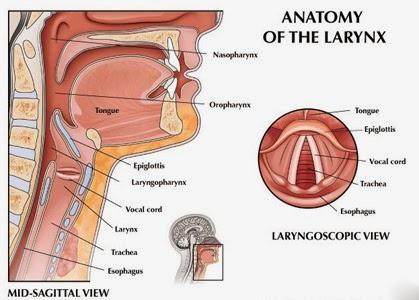Voice is the sound produced by your larynx or ‘voice box’. The larynx contains the ‘engine room’ or the moving parts of the larynx, known as the vocal cords and arytenoid cartilages. The air passing from the lungs through the larynx sets the vocal cords in motion. This creates vibrations or sound waves that travel through your throat, mouth and nose cavities creating a vocal sound unique to you. This is why people may recognise you on the phone without seeing you, by your unique voice quality.

In a healthy vocal system, the voice sounds clear, can reach a range of tones from high to low, can be heard easily by others with normal hearing, can be made louder or softer as you desire, without tiring easily when used every day at work, home or socially. Do you use your voice a lot, or loudly? Is your voice the ‘Tool of your Trade?’ Can you rely on your voice at key moments in conversations? A healthy voice is reliable and sounds clear.
Now as long as your voice is working well, most people do not really think about it. If your voice sounds different to your usual self, perhaps a little husky with a cold or tired after a long day, most people do not notice. They are signs that the voice is not at its best.
You may notice that your voice changes when you are tired or unwell, overload your vocal system by speaking a lot and loudly. These are signs that your voice may be under stress. You may also notice that your voice changes with your emotions, particularly when you feel strong emotions. In fact, others may be aware of your mood even when you are not, just by the sound of your voice. Our ‘voice’ is linked to emotional centres in the brain.
Most people do not become worried about their voice unless it stops working, at work or with loved ones, or if they are unable to sing. A voice problem that persists, will need an Ear Nose and Throat Sounds to take a look at your vocal system. This is done with a tiny camera that is able to view your larynx (voice box) in action, to see what is causing the problem. As long as there is not a medical problem requiring treatment, most often than not, they will refer you to a Speech Pathologist who has experience working with voice. One of the most common terms for a voice problem is muscle tension dysphonia. So if your specialist has referred you for help, you are in the right place!

If you say yes to one or more of the following questions, chances are you have a voice problem.
- Does your voice tire easily?
- Has your voice a rough, raspy, croaky, hoarse or breathy sound?
- Is it difficult to make your voice louder?
- Does your voice feel weak, scratchy, itchy, tight, strained or sore?
- Does it feel as though you have a lump in the throat?
- Do you have a cough or throat clear habit?
- Do you feel pain in the muscles around the voice box?
- Does your voice cut out sometimes?
- Does your voice sound nasal?
- Have your voice problems lasted well after a cold or allergy has been treated?
- Does it feel like you have mucous in the throat?
- Do you have a medical condition that can explain these symptoms?
- Do you work and live in a noisy place or with very loud talkers?
- Have you noticed a connection between stressful or emotional life circumstances and changes in your voice?
- Do you rely on your voice as the ‘Tool of your Trade?’
- Do people ask you if there is something wrong with your voice, or if you are sick?
An ENT can assess your voice difficulty, whether it affects everyday use face-to-face or on the phone with friends or family, conversations at work, singing for pleasure or professionally. If the voice is the ‘tool of your trade’, difficulties with the voice can be devastating and exhausting. These are all indications that you may benefit from seeing an ENT and then a Speech Pathologist with specialist skills and experience in dealing with voice problems.
The ENT Specialist will view your larynx (voice box) with a camera that can look down your throat to the larynx below, and check for any medical or biomechanical issues that may be causing your voice difficulty.
If there is no physical or medical explanation for your voice changes or difficulties, voice therapy may be recommended to help you correct vocal style and voice use habits that may have lead to your voice difficulties. It is possible, there are underlying psycho-emotional factors that are contributing to your voice difficulty. Therapy will help you to understand what is causing your voice problem and how you can overcome it.
If surgery or some other medical intervention is required, your ENT will guide you as to the best timing of therapy for your voice before and/or after surgery. It is very useful to visit your Speech Pathologist before surgery to learn about the gentle reintroduction of voice following surgery. Your surgeon will let you know the best time to start using your voice after surgery, your Speech Pathologist can show you how to use it to promote faster healing and avoid any possible damage to sensitive vocal folds following surgery.
Sharon Moore, and all speech pathologists at Well Spoken, work closely with ENT, singing specialists, psychologists, physiotherapists and Alexander Technique practitioners, to ensure all aspects of the voice problem are addressed and to ensure all the right conditions for voice ‘healing’ are in place.



